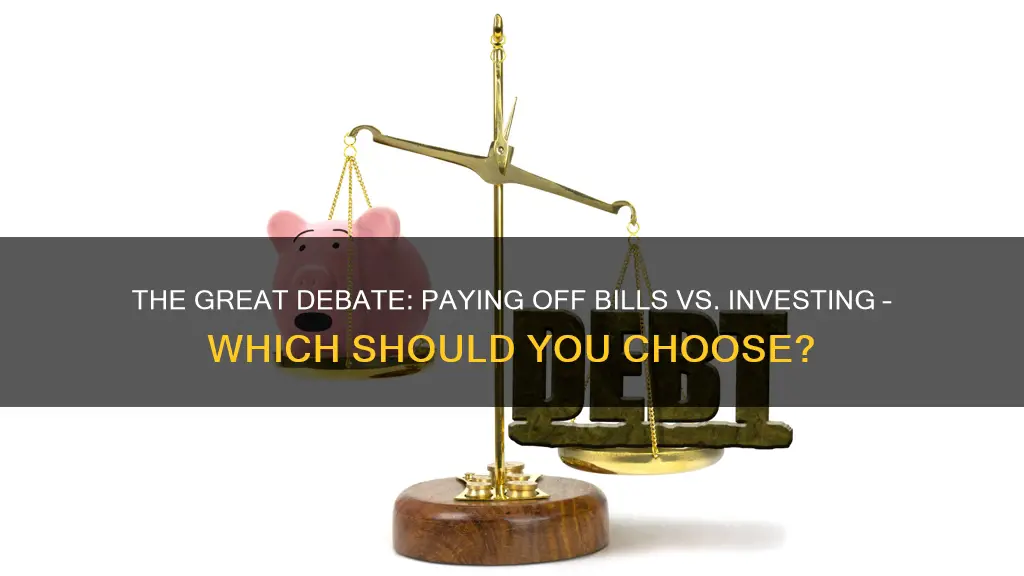
Whether to pay off debt or invest is a common dilemma. Both are worthy goals, and it is possible to do both.
The general rule of thumb is that you should pay off debts and invest. However, if you have high-interest debt, such as credit card debt, it is advisable to focus on paying that off first. Credit card interest rates are often higher than the rate of return on investments, so you will likely be losing money overall if you invest while carrying credit card debt.
On the other hand, some types of debt, such as student loans and mortgages, tend to have lower interest rates. These debts do not need to be paid off as aggressively and may even offer tax advantages.
It is also important to consider your feelings and risk tolerance when deciding whether to pay off debt or invest. If debt is causing you stress, there is nothing wrong with paying it off sooner rather than later.
| Characteristics | Values |
|---|---|
| Interest rate on debt | If the interest rate on your debt is 6% or greater, you should generally pay off debt before investing additional dollars. |
| Interest rate on investments | If your after-tax return on investments is greater than your after-tax cost of your debt, then you should invest the money. |
| Credit card debt | Credit card interest rates in 2021 averaged about 16.65%. |
| Student loan debt | Federal student loans have fixed interest rates between 2.75% and 5.3%. Private student loans can be as high as 12.99% for fixed and 11.98% for variable. |
| Mortgage debt | The average 30-year mortgage rate, with points, was 3.08% for those with excellent credit scores in 2021. |
| Credit score | The lower your credit score, the higher your interest rates. |
| Emergency fund | It is recommended to save an emergency fund of three to six months' worth of expenses before investing. |
| Retirement fund | It is recommended to contribute to a retirement fund, even if it is a small amount. |
| Risk tolerance | If you are comfortable taking the risk that your investments will fluctuate with the market, you may be more inclined to invest. |
| Peace of mind | If debt is causing you stress, there is nothing wrong with paying it off sooner, as you can't put a price on your peace of mind. |
What You'll Learn

Pay off high-interest debt before investing
If you have high-interest debt, such as credit card debt, it is generally recommended to focus on paying this off before investing. Credit card interest rates can be very high, often exceeding 20%, and this type of debt can be costly over time, making it more challenging to pay off. By tackling high-interest debt first, you can save a significant amount of money in interest payments.
For example, let's say you have credit card debt with an interest rate of 20%. If you invest your money instead of paying off this debt, you would need to earn a higher return on your investments just to break even. In other words, your investments would need to provide a return of more than 20% just to match the interest charges on your credit card debt.
Additionally, credit card debt can negatively impact your credit score and utilization rate. A high credit utilization rate, which is the proportion of your available credit that you're using, can lead to lower credit scores. This, in turn, may result in higher interest rates when you need to borrow money in the future.
By prioritizing the repayment of high-interest credit card debt, you can improve your financial situation in several ways. First, you will save money on interest charges. Second, you will reduce the risk of damaging your credit score. Finally, by freeing up cash flow, you will have more funds available for emergency savings or future investments.
It is worth noting that not all debt is created equal. Some types of debt, such as student loans or mortgages, tend to have lower interest rates and may even offer tax incentives. As a result, the urgency to pay off these types of debt may be lower, and it may make more sense to invest simultaneously while making the minimum payments on these lower-interest loans.
In conclusion, when deciding between paying off debt or investing, it is crucial to consider the interest rates and tax implications of your debt, as well as the potential returns on your investments. By paying off high-interest debt first, you can improve your financial stability, reduce stress, and set yourself up for more successful investing in the future.
Amazon: Worth Your Investment?
You may want to see also

Investing early can impact your long-term retirement
Investing early in life can have a significant impact on your long-term retirement success. Here's how:
Compound Interest
Compound interest is often cited as the most significant benefit of investing early for retirement. When you start saving for retirement earlier, you benefit from compound interest, which is the process of a sum of money growing exponentially due to interest building upon itself over time. The earlier you start, the more time your investments have to grow, and the larger your retirement nest egg can become. This is especially advantageous if you start investing in your 20s or as soon as you start earning an income.
Financial Flexibility
The longer you wait to save for retirement, the more you'll need to set aside from your paycheck to achieve your desired retirement goals. By investing early, you can contribute smaller amounts over a more extended period, making it easier to manage your day-to-day expenses while still building a substantial retirement fund.
Access to Higher-Risk, Higher-Reward Investments
Starting to invest early grants you access to a more diversified portfolio. You have the time to tap into higher-risk, higher-reward investments with the potential for significant returns. Enrolling in such investment opportunities can give you a more substantial financial cushion when you retire.
Long-Term Tax Benefits
Early retirement savings can take advantage of tax-advantaged accounts, such as a 401(k) or an Individual Retirement Account (IRA). Contributions to these accounts can reduce your taxable income and allow for tax-free growth over the long term.
Securing Your Financial Future
The sooner you start saving for retirement, the more secure your financial future becomes. Early retirement savings have the potential to yield higher returns and can help ensure you have enough funds to support you throughout your retirement years.
Safemoon Investors: Who's In?
You may want to see also

Compare the rate of return on your investments to your credit card's APR
When deciding whether to pay off debt or invest, it is important to compare the rate of return on your investments with your credit card's annual percentage rate (APR).
The APR is the yearly interest generated by a sum charged to borrowers, including any fees or additional costs associated with the transaction. Credit card companies are legally required to disclose the APR to customers before they sign an agreement. Credit card APRs vary based on the type of charge, with different APRs for purchases, cash advances, and balance transfers. Issuers also charge high-rate penalty APRs for late payments or violation of other terms.
The rate of return on investments is the interest you earn on those investments. This can be compared with the APR on your credit card debt to determine which is the better financial decision.
Historically, the average rate of return for stock market investments is around 10%, while the average APR on credit cards is above 20%. So, if you are investing when you have credit card debt, you are likely paying a higher interest rate on your debt than you are earning on your investments. In this case, it would make more financial sense to pay off your credit card debt before investing.
However, it is important to note that the decision to pay off debt or invest depends on various factors, including your risk tolerance, credit score, and time until retirement. It is also possible to do both by contributing to debt payoff, retirement, and an emergency fund simultaneously.
Global Investing: Why Go International?
You may want to see also

Consider your risk tolerance
When deciding whether to pay off bills or invest, it's important to consider your risk tolerance, which can be influenced by various factors, including your financial situation, goals, and personal feelings about money. Here are some key points to keep in mind:
- Financial Situation and Goals: Your current financial situation and short-term goals play a crucial role in determining your risk tolerance. If you have high-interest credit card debt, it's generally advisable to prioritize paying it off first as it can help improve your credit score and reduce financial stress. In contrast, if you're nearing retirement and haven't met your financial target, investing may take precedence to boost your retirement savings.
- Time Horizon: Your time horizon, or the amount of time you have until you need the money, is another factor that influences your risk tolerance. If you're young, you may have a higher risk tolerance since you have more time to recover from potential investment losses. As you approach retirement, your risk tolerance may decrease as preserving your capital becomes more critical.
- Psychological Factors: Risk tolerance is also influenced by psychological factors, such as your comfort with debt and your attitude towards investing. Some people are comfortable taking on debt and don't mind the associated risks, while others prefer to avoid debt altogether. Similarly, some individuals are comfortable with the volatility of the stock market, while others may worry about market fluctuations and losing money. Understanding your psychological relationship with money can help you assess your risk tolerance.
- Credit Utilization and Debt-to-Income Ratio: Monitoring your credit utilization rate and debt-to-income ratio can provide valuable insights into your risk tolerance. Keeping your credit utilization below 30% is generally recommended to maintain a good credit score. Additionally, lenders often use the debt-to-income ratio to assess your ability to take on new debt. Keeping your debt-to-income ratio below 36% is ideal, as it indicates a healthy balance between debt and income.
- Personal Comfort Level: Ultimately, your risk tolerance is deeply personal and depends on your comfort level with taking financial risks. Some individuals are naturally more risk-averse, while others are comfortable taking calculated risks. Reflect on your financial personality and be honest with yourself about your ability to tolerate risk.
In conclusion, when deciding between paying off bills or investing, carefully consider your risk tolerance by evaluating your financial situation, goals, time horizon, psychological factors, and personal comfort level. This introspection will help guide your decision-making process and ensure that your choices align with your financial priorities and risk appetite.
Fidelity Investments: Unveiling the Compensation Culture
You may want to see also

Consult a financial advisor
Deciding whether to pay off bills or invest can be a complex decision that depends on your financial situation and goals. Here are some reasons why consulting a financial advisor can be beneficial:
- Financial advisors are experts who can provide guidance based on your specific circumstances. They will take into account your income, expenses, debt obligations, risk tolerance, and financial goals to develop a tailored plan.
- They can help you understand the potential risks and rewards of different options. For example, investing in the stock market carries risks, and a financial advisor can explain these and help you assess whether it is a suitable option for you.
- Financial advisors can provide strategies for managing debt and investing simultaneously. They can advise on prioritising high-interest debt, such as credit card debt, while also contributing to retirement savings and emergency funds.
- They can offer guidance on tax implications. Certain types of debt, such as student loans or mortgages, may offer tax incentives depending on your income. A financial advisor can help you understand these complexities and make informed decisions.
- Financial advisors provide objective advice and can help you avoid emotional decision-making. They can assist in balancing the emotional benefits of becoming debt-free with the potential long-term gains from investing.
- They can also help you navigate the psychological aspects of your decision. For example, if your debt is causing you stress and affecting your peace of mind, a financial advisor may recommend prioritising debt repayment to improve your overall well-being.
- Financial advisors have the expertise to help you compare interest rates on your debt with potential investment returns. They can perform calculations and provide insights to determine whether investing or debt repayment is the better financial choice.
- They can offer a range of options and strategies, such as debt consolidation or balance transfers, to help you manage your debt more effectively and improve your overall financial health.
- Financial advisors provide accountability and support. They can work with you to create a budget, set financial goals, and stay on track with your plan.
- Consulting a financial advisor can give you peace of mind, knowing that you are making informed decisions about your financial future.
FTX: Celebrity Investors
You may want to see also
Frequently asked questions
It depends on your circumstances. If you have high-interest debt, it's best to pay that off first. If you have a low-interest loan, investing may be a better option. You could also do a combination of both.
Paying off debt means you no longer have to pay interest on what you owe. This can save you hundreds or thousands of dollars in the long run. It can also improve your credit score and reduce stress.
Investing can help you build wealth over time, especially if you start early. It can also be more fun than saving and help you get into good financial habits.
You should compare the interest rates on your debt to the potential returns on your investments. You should also think about your risk tolerance, how much debt you have, and how much money you have available.







